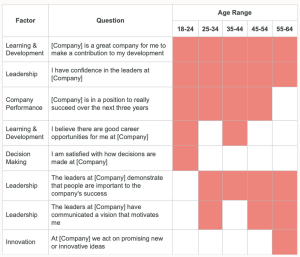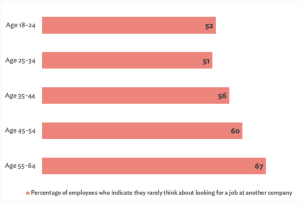If you hired new talent right at the start of this year, then sorry, there’s some bad news I need to tell you.
They’re probably already thinking of leaving.
According to new research by Culture Amp, the length of the usual period of high engagement CHROs could expect from new joiners – their so-called ‘honeymoon period’ – has fallen dramatically fallen off a cliff.
Its data suggest it now lasts for just six months – meaning that your January new-starts are already thinking it’s time for them to look elsewhere.
This is a worry
While horrific-sounding data around employees’ quit intentions are not new (in fact recently it was revealed that nearly 50% of Americans say they plan to quit their jobs this year); the finding that new employees are feeling disengaged so soon (and for dramatically shorter periods of time), should be a massive wake-up call.
This is because Culture Amp says the typical honeymoon period has long been a good 18 months to two years. This steep decline indicates there must be something really big happening for this to be slashed to just six months.
So what exactly is going on?
To understand this more, and to pick up on what this data says, TLNT spoke exclusively to Heather Walker, senior people scientist at Culture Amp:
Q: Gulp, the honeymoon really is over quick now. What was this data looking at, and how surprised were you by its results?
A: “We constantly look at tenure data, what impacts it, and how it can be improved, and this time round we decided to look and compare the descriptive assessments of people whose tenure was six months or less, against those where it was 6-12 months. What we found was that by six months, there was a 10% drop in people’s perception of fair total compensation; an 8% drop in employees’ perception of there being honest and two-way conversations; and a 10% drop in people’s perceptions of having good career opportunities. We would normally ‘not’ expect to see this until at least tenure of a year and a half to two years, and so the results were definitely a surprise – and a worry.
Q: But just how worried are you about this? Isn’t it just the case that six months in, people get to know the lie of the land a bit more, and the initial gloss has gone – and that’s this is just natural?
A: “There’s certainly an element of this, but the compensation element was definitely a surprise. We’re used to seeing this realization forming much later into people’s tenures. We think staff are realizing more quickly that the effort they are putting in is not being reflected by what they think they should be being paid. I also think companies are almost setting themselves up for this level of disengagement. For instance, many companies outwardly signal how great their career development is now, and so new joiners are more actively looking for it, and demanding it. Maybe they’re finding that the career path espoused when they first joined is not being made clear, or that isn’t there at all, and they’re seeing that they have nowhere to go sooner. This flows into the communications element too. Joiners are comparing their current experience to what they saw before they joined, and are deciding it’s not as aligned at they thought.”
Q: Is there a common theme that you think ties all these things together?
A: “I think that if were are looking at these three aspects as a whole, what I think it’s telling us is something about ‘voice’ and ‘self worth’. People want a sense that they can advance, and they also want to be counted.
Q: Isn’t this data simply a reflection of poor recruitment, rather than a failure of keeping people engaged – ie they were sold a promise that simply doesn’t exist?
A: “I’m not sure. All this stuff is definitely happening after people have been hired, so on the one hand I think it’s clear that there might have been an element of overselling the job. But this data also indicates that the onboarding process hasn’t been handled well either. And while I think a drop off in engagement is always natural, the key is working out how to make the honeymoon period last longer.
Q: Is this drop in engagement unique to this moment in time though – that people just don’t seem to be happy wherever they are?
A: “It’s definitely a trend that’s of-the-moment, and that’s because I think there’s been a lot of focus on employee performance, but staff don’t feel like they’re being given the resources they need to deliver on these performance requests. And that’s leading to a much earlier drop in engagement levels. Oh, and by the way, this is a trend that is cross-generational too. It seems everyone is upset by the current state of their working experiences.
Q: So how are employers expected to turn this around?
A: “I think better transparency could be the common answer that works across all these areas of concern. Employees that know where they are going – and where they fit in – are also more engaged employees. They’re engaged because they’re not having to fill in the blanks themselves. This is why it’s so important for CHROs and organizations as a whole to be better at their career pathing. Career pathing really does trump everything else. The sense that there is a lack of career progression is still the top driver of why people quit organizations.
Q: But isn’t the problem that many organizations just ‘don’t’ have the scope to keep offering career progression?
A: “This is certainly a factor, but even if you’re able to say ‘we’ve not got something now, but we might have something six or nine months down the line’, then that’s a form of signposting to future opportunities. Then, employees have the information they need to either leave or stay committed. Remember, it’s confused employees that fear the worst. That’s when they think information is being withheld.”
Q: Does the fact the honeymoon period has dropped to six months at least tell us that firms can’t go any worse, and that this is as bad as it’s going to get? Can things only improve from now-on in, yes?
A: “Yes, I think you’re right. I can’t imagine that people would start feeling disengaged much earlier. It takes people a few months to get their bearings, and get to know the lie of the land, and then if someone does have questions, they normally take a few months to gestate into intention to leave. I think the question employers need to answer is why are employees starting to feel like they are so early, and where is this problem stemming from? Is it that staff are feeling disengaged faster themselves, or is it because staff are feeling disengaged earlier because employers aren’t doing enough to ‘keep’ them engaged.”
Q: Is the future bright then?
A: “It certainly has the potential to be. You have to remember that it’s us who invented company structures, and so it’s entirely possible that they can be changed. It’s whether there is the willingness to do this. Companies used to actually have benefits that rewarded tenure, but these seem to have been dropped. There has to be a happy medium, and a way of helping employees stay happier for longer.”
Drivers of engagement:


Source: Culture Amp
